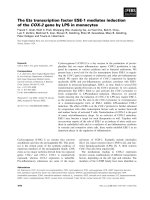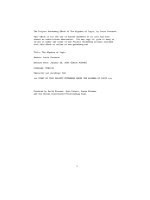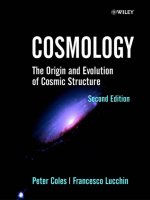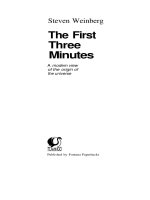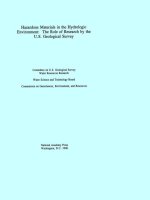The Reception of the ''''Origin of Species'''', by Thomas Henry Huxley doc
Bạn đang xem bản rút gọn của tài liệu. Xem và tải ngay bản đầy đủ của tài liệu tại đây (8.54 MB, 104 trang )
The Project Gutenberg EBook of The
Reception of the 'Origin of Species', by
Thomas Henry Huxley
This eBook is for the use of anyone
anywhere at no cost and with
almost no restrictions whatsoever. You may
copy it, give it away or
re-use it under the terms of the Project
Gutenberg License included
with this eBook or online at
www.gutenberg.net
Title: The Reception of the 'Origin of
Species'
Author: Thomas Henry Huxley
Posting Date: October 26, 2008 [EBook
#2089]
Release Date: February, 2000
Language: English
*** START OF THIS PROJECT GUTENBERG EBOOK
RECEPTION OF 'ORIGIN OF SPECIES' ***
Produced by Sue Asscher. HTML version by
Al Haines.
ON THE
RECEPTION OF
THE
'ORIGIN OF
SPECIES'
by
PROFESSOR
THOMAS HENRY
HUXLEY
FROM THE LIFE AND LETTERS OF
CHARLES DARWIN
EDITED BY FRANCIS DARWIN
ON THE RECEPTION
OF THE 'ORIGIN OF
SPECIES.'
To the present generation, that is to say,
the people a few years on the hither and
thither side of thirty, the name of Charles
Darwin stands alongside of those of Isaac
Newton and Michael Faraday; and, like
them, calls up the grand ideal of a
searcher after truth and interpreter of
Nature. They think of him who bore it as a
rare combination of genius, industry, and
unswerving veracity, who earned his
place among the most famous men of the
age by sheer native power, in the teeth of
a gale of popular prejudice, and
uncheered by a sign of favour or
appreciation from the official fountains of
honour; as one who in spite of an acute
sensitiveness to praise and blame, and
notwithstanding provocations which might
have excused any outbreak, kept himself
clear of all envy, hatred, and malice, nor
dealt otherwise than fairly and justly with
the unfairness and injustice which was
showered upon him; while, to the end of
his days, he was ready to listen with
patience and respect to the most
insignificant of reasonable objectors.
And with respect to that theory of the
origin of the forms of life peopling our
globe, with which Darwin's name is
bound up as closely as that of Newton
with the theory of gravitation, nothing
seems to be further from the mind of the
present generation than any attempt to
smother it with ridicule or to crush it by
vehemence of denunciation. "The struggle
for existence," and "Natural selection,"
have become household words and every-
day conceptions. The reality and the
importance of the natural processes on
which Darwin founds his deductions are
no more doubted than those of growth and
multiplication; and, whether the full
potency attributed to them is admitted or
not, no one doubts their vast and far-
reaching significance. Wherever the
biological sciences are studied, the
'Origin of Species' lights the paths of the
investigator; wherever they are taught it
permeates the course of instruction. Nor
has the influence of Darwinian ideas been
less profound, beyond the realms of
Biology. The oldest of all philosophies,
that of Evolution, was bound hand and
foot and cast into utter darkness during the
millennium of theological scholasticism.
But Darwin poured new life-blood into
the ancient frame; the bonds burst, and the
revivified thought of ancient Greece has
proved itself to be a more adequate
expression of the universal order of things
than any of the schemes which have been
accepted by the credulity and welcomed
by the superstition of seventy later
generations of men.
To any one who studies the signs of the
times, the emergence of the philosophy of
Evolution, in the attitude of claimant to the
throne of the world of thought, from the
limbo of hated and, as many hoped,
forgotten things, is the most portentous
event of the nineteenth century. But the
most effective weapons of the modern
champions of Evolution were fabricated
by Darwin; and the 'Origin of Species' has
enlisted a formidable body of combatants,
trained in the severe school of Physical
Science, whose ears might have long
remained deaf to the speculations of a
priori philosophers.
I do not think any candid or instructed
person will deny the truth of that which
has just been asserted. He may hate the
very name of Evolution, and may deny its
pretensions as vehemently as a Jacobite
denied those of George the Second. But
there it is—not only as solidly seated as
the Hanoverian dynasty, but happily
independent of Parliamentary sanction—
and the dullest antagonists have come to
see that they have to deal with an
adversary whose bones are to be broken
by no amount of bad words.
Even the theologians have almost ceased
to pit the plain meaning of Genesis against
the no less plain meaning of Nature. Their
more candid, or more cautious,
representatives have given up dealing
with Evolution as if it were a damnable
heresy, and have taken refuge in one of
two courses. Either they deny that Genesis
was meant to teach scientific truth, and
thus save the veracity of the record at the
expense of its authority; or they expend
their energies in devising the cruel
ingenuities of the reconciler, and torture
texts in the vain hope of making them
confess the creed of Science. But when the
peine forte et dure is over, the antique
sincerity of the venerable sufferer always
reasserts itself. Genesis is honest to the
core, and professes to be no more than it
is, a repository of venerable traditions of
unknown origin, claiming no scientific
authority and possessing none.
As my pen finishes these passages, I can
but be amused to think what a terrible
hubbub would have been made (in truth
was made) about any similar expressions
of opinion a quarter of a century ago. In
fact, the contrast between the present
condition of public opinion upon the
Darwinian question; between the
estimation in which Darwin's views are
now held in the scientific world; between
the acquiescence, or at least quiescence,
of the theologians of the self-respecting
order at the present day and the outburst of
antagonism on all sides in 1858-9, when
the new theory respecting the origin of
species first became known to the older
generation to which I belong, is so
startling that, except for documentary
evidence, I should be sometimes inclined
to think my memories dreams. I have a
great respect for the younger generation
myself (they can write our lives, and ravel
out all our follies, if they choose to take
the trouble, by and by), and I should be
glad to be assured that the feeling is
reciprocal; but I am afraid that the story of
our dealings with Darwin may prove a
great hindrance to that veneration for our
wisdom which I should like them to
display. We have not even the excuse that,
thirty years ago, Mr. Darwin was an
obscure novice, who had no claims on our
attention. On the contrary, his remarkable
zoological and geological investigations
had long given him an assured position
among the most eminent and original
investigators of the day; while his
charming 'Voyage of a Naturalist' had
justly earned him a wide-spread
reputation among the general public. I
doubt if there was any man then living
who had a better right to expect that
anything he might choose to say on such a
question as the Origin of Species would
be listened to with profound attention, and
discussed with respect; and there was
certainly no man whose personal
character should have afforded a better
safeguard against attacks, instinct with
malignity and spiced with shameless
impertinences.
Yet such was the portion of one of the
kindest and truest men that it was ever my
good fortune to know; and years had to
pass away before misrepresentation,
ridicule, and denunciation, ceased to be
the most notable constituents of the
majority of the multitudinous criticisms of
his work which poured from the press. I
am loth to rake any of these ancient
scandals from their well-deserved
oblivion; but I must make good a statement
which may seem overcharged to the
present generation, and there is no piece
justificative more apt for the purpose, or
more worthy of such dishonour, than the
article in the 'Quarterly Review' for July,
1860. (I was not aware when I wrote
these passages that the authorship of the
article had been publicly acknowledged.
Confession unaccompanied by penitence,
however, affords no ground for mitigation
of judgment; and the kindliness with which
Mr. Darwin speaks of his assailant,
Bishop Wilberforce (vol. ii.), is so
striking an exemplification of his singular
gentleness and modesty, that it rather
increases one's indignation against the
presumption of his critic.) Since Lord
Brougham assailed Dr. Young, the world
has seen no such specimen of the
insolence of a shallow pretender to a
Master in Science as this remarkable
production, in which one of the most exact
of observers, most cautious of reasoners,
and most candid of expositors, of this or
any other age, is held up to scorn as a
"flighty" person, who endeavours "to prop
up his utterly rotten fabric of guess and
speculation," and whose "mode of dealing
with nature" is reprobated as "utterly
dishonourable to Natural Science." And
all this high and mighty talk, which would
have been indecent in one of Mr. Darwin's
equals, proceeds from a writer whose
want of intelligence, or of conscience, or
of both, is so great, that, by way of an
objection to Mr. Darwin's views, he can
ask, "Is it credible that all favourable
varieties of turnips are tending to become
men;" who is so ignorant of paleontology,
that he can talk of the "flowers and fruits"
of the plants of the carboniferous epoch;
of comparative anatomy, that he can
gravely affirm the poison apparatus of the
venomous snakes to be "entirely separate
from the ordinary laws of animal life, and
peculiar to themselves;" of the rudiments
of physiology, that he can ask, "what
advantage of life could alter the shape of
the corpuscles into which the blood can be
evaporated?" Nor does the reviewer fail
to flavour this outpouring of preposterous
incapacity with a little stimulation of the
odium theologicum. Some inkling of the
history of the conflicts between
Astronomy, Geology, and Theology, leads
him to keep a retreat open by the proviso
that he cannot "consent to test the truth of
Natural Science by the word of
Revelation;" but, for all that, he devotes
pages to the exposition of his conviction
that Mr. Darwin's theory "contradicts the
revealed relation of the creation to its
Creator," and is "inconsistent with the
fulness of his glory."
If I confine my retrospect of the
reception of the 'Origin of Species' to a
twelvemonth, or thereabouts, from the
time of its publication, I do not recollect
anything quite so foolish and unmannerly
as the 'Quarterly Review' article, unless,
perhaps, the address of a Reverend
Professor to the Dublin Geological
Society might enter into competition with
it. But a large proportion of Mr. Darwin's
critics had a lamentable resemblance to
the 'Quarterly' reviewer, in so far as they
lacked either the will, or the wit, to make
themselves masters of his doctrine; hardly
any possessed the knowledge required to
follow him through the immense range of
biological and geological science which
the 'Origin' covered; while, too
commonly, they had prejudiced the case
on theological grounds, and, as seems to
be inevitable when this happens, eked out
lack of reason by superfluity of railing.
But it will be more pleasant and more
profitable to consider those criticisms,
which were acknowledged by writers of
scientific authority, or which bore internal
evidence of the greater or less competency
and, often, of the good faith, of their
authors. Restricting my survey to a
twelvemonth, or thereabouts, after the
publication of the 'Origin,' I find among
such critics Louis Agassiz ("The
arguments presented by Darwin in favor
of a universal derivation from one primary
form of all the peculiarities existing now
among living beings have not made the
slightest impression on my mind."
"Until the facts of Nature are shown to
have been mistaken by those who have
collected them, and that they have a
different meaning from that now generally
assigned to them, I shall therefore
consider the transmutation theory as a
scientific mistake, untrue in its facts,
unscientific in its method, and
mischievous in its tendency."—Silliman's
'Journal,' July, 1860, pages 143, 154.
Extract from the 3rd volume of
'Contributions to the Natural History of the
United States.'); Murray, an excellent
entomologist; Harvey, a botanist of
considerable repute; and the author of an
article in the 'Edinburgh Review,' all
strongly adverse to Darwin. Pictet, the
distinguished and widely learned
paleontogist of Geneva, treats Mr. Darwin
with a respect which forms a grateful
contrast to the tone of some of the
preceding writers, but consents to go with
him only a very little way. ("I see no
serious objections to the formation of
varieties by natural selection in the
existing world, and that, so far as earlier
epochs are concerned, this law may be
assumed to explain the origin of closely
allied species, supposing for this purpose
a very long period of time."
"With regard to simple varieties and
closely allied species, I believe that Mr.
Darwin's theory may explain many things,
and throw a great light upon numerous
questions."—'Sur l'Origine de l'Espece.
Par Charles Darwin.' 'Archives des Sc. de
la Bibliotheque Universelle de Geneve,'
pages 242, 243, Mars 1860.) On the other
hand, Lyell, up to that time a pillar of the
anti-transmutationists (who regarded him,
ever afterwards, as Pallas Athene may
have looked at Dian, after the Endymion
affair), declared himself a Darwinian,
though not without putting in a serious
caveat. Nevertheless, he was a tower of
strength, and his courageous stand for truth
as against consistency, did him infinite
honour. As evolutionists, sans phrase, I do
not call to mind among the biologists more
than Asa Gray, who fought the battle
splendidly in the United States; Hooker,
who was no less vigorous here; the
present Sir John Lubbock and myself.
Wallace was far away in the Malay
Archipelago; but, apart from his direct
share in the promulgation of the theory of
natural selection, no enumeration of the
influences at work, at the time I am
speaking of, would be complete without
the mention of his powerful essay 'On the
Law which has regulated the Introduction
of New Species,' which was published in
1855. On reading it afresh, I have been
astonished to recollect how small was the
impression it made.
In France, the influence of Elie de
Beaumont and of Flourens—the former of
whom is said to have "damned himself to
everlasting fame" by inventing the
nickname of "la science moussante" for
Evolutionism (One is reminded of the
effect of another small academic epigram.
The so-called vertebral theory of the skull
is said to have been nipped in the bud in
France by the whisper of an academician
to his neighbour, that, in that case, one's
head was a "vertebre pensante."),—to say
nothing of the ill-will of other powerful
members of the Institut, produced for a
long time the effect of a conspiracy of
silence; and many years passed before the
Academy redeemed itself from the
reproach that the name of Darwin was not
to be found on the list of its members.


